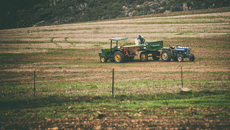
Minister of Finance Tito Mboweni opened the budget with an explanation of farming and the importance of soil preparation for a good harvest. Soil preparation is very important and can certainly contribute to reaping good yields. But sometimes even if soil preparation is done, and seed and fertiliser placed within the soil with precision, a harvest will not realise if no rain is forthcoming.
The grain industry is currently under severe financial pressure due to the constant drought and irregular climate conditions over the past five production cycles. Producers have large carryover debt with negative cash flow scenarios, which limits credit opportunities and financial sustainability. In terms of drought relief, little help has been offered to grain producers thus far. In order to assist grain producers, special credit arrangements or additional cash flow is required in order to keep the producer in the production cycle. Worldwide, grain producers are supported by means of crop insurance programs, supported by the respective governments.
Grain SA has been advocating for a similar program for more than six years, and this was also suggested within the NAMC, Section 7 drought committee report, presented and approved by the previous Minister of Agriculture. It is noted with concern that no mention was made about drought relief in this medium-term budget, although various provinces did receive disaster status. It is even more concerning that the summer crop will, yet again, approach a production cycle without viable protection. In this regard, food security has to be regarded as a national asset – just like Eskom.
A cost effective crop insurance scheme will support grain producers in periods of difficult climatic conditions, where producers have no influence on improving the scenario. This will assist the country in terms of sustaining food security nationally, and rural regions in terms of economic sustainability. Agriculture is the pillar of any economy and can assist greatly with prospects of economic growth and job creation.
Nonetheless, Grain SA welcomes the efforts towards and citing of the improvement plans and blended financing model regarding infrastructure, more specifically bulk transport within rails and ports. Such infrastructure plays a very important role within the grain value chain, and the global competitiveness level of the industry. In terms of the Eskom turn-around it is of utmost importance to the agricultural industry that electricity is provided at an affordable and consistent supply. The reprioritised funding over the medium-term is vital - especially from the comprehensive agricultural support programme grant, to increase compliance with biosecurity, animal and plant health, and phytosanitary and sanitary standards to improve trade in agricultural exports. This, together with the export reform supported by focused and flexible industrial and trade policy with the promoting of agriculture, is positive. The post-settlement support in collaboration with agricultural commodity organisations is very important, since these organisations have illustrated over the years that they can assist with great results. All of the above will support the industry to produce and process food for the nation.
Ends
Issued by:
Grain SA Communications
Further enquiries:
Dirk Strydom, Manager: Grain Economy & Marketing, Grain SA
086 004 7246 | dirk@grainsa.co.za